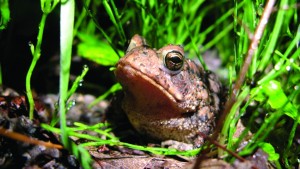“I have a passion, an interest, and an excitement about them, that’s the bottom line,” Professor David Huth, communications, said about his research about amphibians, slapping the table with both hands for emphasis.

Hydrofracking and clearcutting are causing a large-scale destruction of amphibian populations. Huth’s work attempts to understand what is causing the decline, and also what the implications of such a decline will be. Huth said, leaning forward and touching the tips of his fingers together, “My daughter might not have any amphibians to show her daughter. Populations are crashing around the world.”
Professor Sullivan, biology, has also seen the deterioration of worldwide populations in the last ten years. Regarding the impact of such a decline Sullivan said,”It’s huge; they play a very important role in keeping ecosystems functional.” Amphibians have very thin skin, and potential toxins can cause drastic effects to their health. This can warn of potential danger to humans, like a “canary in a mine shaft,” Sullivan cautioned.
Amphibians represent a whole level of the food chain, and disruption could have massive and unforeseen consequences. Huth said, “There may be other repercussions too. It may mean that what is killing the amphibians will come for us next.”
Huth, Assistant Professor of Visual Communications and Media Arts, used the resources provided from a grant to begin working on an enhanced e-book, based primarily on photography and video.
“I want to use some of my communication skills to do some kind of public educational, communication-technology kind of thing about how awesome amphibians are,” Huth explained excitedly. During the almost two years he has been working on this project, it has since developed into a collection of web-based electronic materials containing a vast array of information. Huth grinned, “Basically, the project keeps getting bigger and bigger the more I work on it.”
Professor Aaron Sullivan focuses on biological research, specifically predator-prey interactions in amphibians. His reserved, thoughtful manner is a contrast to Huth’s enthusiasm, yet there is an undercurrent of dry humor just under the surface of his speech. “I’m interested in how natural selection shapes behavior of organisms. My area of expertise would be how chemical information in an environment influences antipredator behavior in amphibians, primarily salamanders,” he said quietly.
Sullivan described how he has studied amphibians and reptiles since 1997 for two reasons. The first is very practical: they’re relatively easy to find and maintain in a lab. The second reason he is interested in amphibians is due to their complex behaviors, interesting sensory abilities, and because he “just likes them.”
Huth says amphibians are “self-evidently spectacular.” He explained how amphibians are the longest-living order of land animals and his fascination with their evolutionary history and adaptations. They secrete some of the most powerful neurotoxins known from their skin and a whole category freeze during the winter to thaw and continue living in the spring.
Huth said, “All the things I’ve described so far [about amphibians] are within, I don’t know, a hundred yards of where I’m sitting talking to you.”
Sullivan smiled lightly and confirmed regarding his research, “I’m having fun.”
